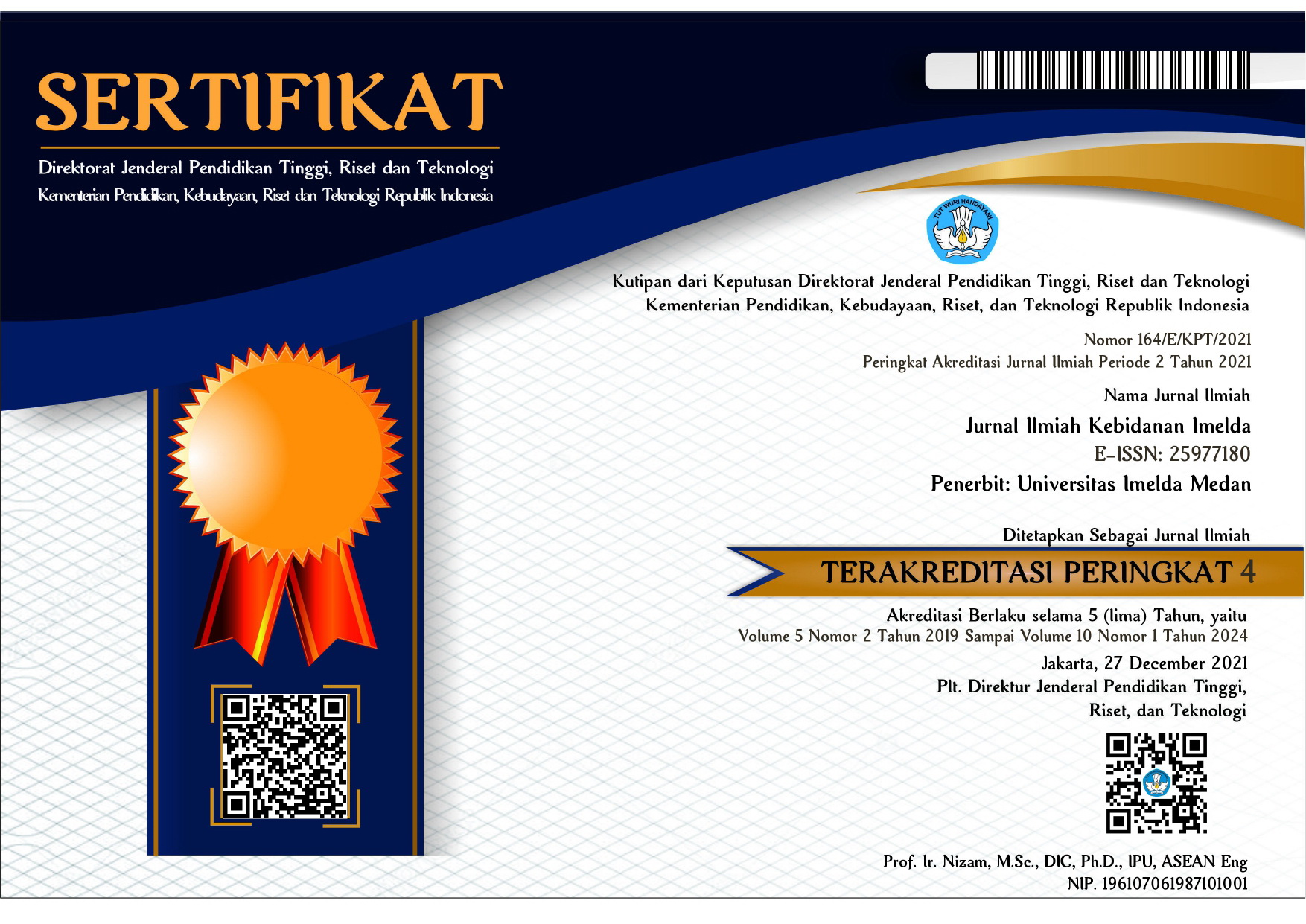PENGEMBANGAN MODUL EFIKASI DIRI DALAM MENGHADAPI PERSALINAN NORMAL BERBASIS KARIKATUR DALAM MENINGKATKAN PENGETAHUAN IBU HAMIL
DOI:
https://doi.org/10.52943/jikebi.v9i2.1361Keywords:
Self-Efficacy, Module, KnowledgeAbstract
The incidence of childbirth complications itself is a determinant of maternal morbidity and mortality. The importance of preparation is carried out as a program of instruction with a specific purpose and structure. Birth preparation aims to prepare all the needs during pregnancy and childbirth. Mother's self-efficacy can describe the ability to go through the birth process well. This is an important factor influencing women's motivation to give birth normally. This study aims to develop a caricature-based module to increase mothers' self-efficacy in dealing with normal delivery. The design used in this study is the R & D (Research and Development) method through 5 stages. After developing the module, a product trial was carried out using the Pilot Study. The number of participants in the module trial was 20 participants who were Trimester II and Trimester III pregnant women. Data analysis was carried out by descriptive and paired T-test. The results of the research show that development has been carried out through literature studies and focus group discussions (FGD) with the stages of material validation by 4 material experts and 2 media experts, where the results of the posttest module trial score were 81.04. The increase in knowledge before and after education is 24.99. This shows that the developed module can increase mother's knowledge. The developed module can be used by pregnant women to increase knowledge that will support the increase in the mother's self-efficacy in dealing with childbirth.
References
T. Tonasih and D. Kumalasary, “Faktor-Faktor Yang Mempengaruhi Kejadian Berat Bayi Lahir Rendah (BBLR) DI Puskesmas Wilayah Kecamatan Harjamukti Kota Cirebon Tahun 2016,” J. Ris. Kebidanan Indones., vol. 2, no. 1, pp. 21–27, 2018, doi: 10.32536/jrki.v2i1.21.
J. Sudirman, R. Eryanti K, and H. K, “Faktor Risiko Kejadian Stres Pada Ibu Hamil Primigravida Di Masa Pandemi Covid-19,” J. Ilm. PANNMED (Pharmacist, Anal. Nurse, Nutr. Midwivery, Environ. Dent., vol. 17, no. 2, pp. 270–275, 2022, doi: 10.36911/pannmed.v17i2.1328.
C. V. Paredes Mondragón, H. Molano Dorado, S. Y. Martínez Gómez, R. A. Ortiz Martínez, S. Arias Linthon, and A. C. López Benavides, “Relationship between the absence of adequate social support during pregnancy and low birth weight,” Rev. Colomb. Psiquiatr. (English ed.), vol. 48, no. 3, pp. 140–148, 2019, doi: https://doi.org/10.1016/j.rcpeng.2017.11.002.
R. Rahmawati, S. Umar, and Meti, “Hubungan Anemia Pada ibu Hamil dengan Kejadian Bayi Berat Lahir Rendah di Klinik Pratama Fatimah Medan,” Media Kebidanan, pp. 27–32, 2017.
N. L. Rambe and K. Nisa, “Pengaruh Dukungan Keluarga Terhadap Tumbuh Kembang Balita,” J. Ilm. Kebidanan Imelda, vol. 9, no. 1, pp. 49–54, 2023, doi: 10.52943/jikebi.v9i1.1156.
D. L. Olds, “Improving the Life Chances of Vulnerable Children and Families with Prenatal and Infancy Support of Parents: The Nurse-Family Partnership TT - Un Programa de Apoyo Parental Prenatal e Infantil para Mejorar las Oportunidades Vitales de Niños y Niñas de Fa,” Interv. Psicosoc., vol. 21, no. 2, pp. 129–143, 2012, doi: http://dx.doi.org/10.5093/in2012a14.
J. Sudirman and S. Usman, “Efektifitas Edukasi Maternal Mental Health terhadap Kesehatan Mental Ibu Selama Masa Kehamilan,” pp. 317–322, 2023.
C. Franta et al., “Supporting Carers of Children and Adolescents with Eating Disorders in Austria (SUCCEAT): Study protocol for a randomised controlled trial.,” Eur. Eat. Disord. Rev. J. Eat. Disord. Assoc., vol. 26, no. 5, pp. 447–461, Sep. 2018, doi: 10.1002/erv.2600.
V. O. Jaya and C. S. Pratiwi, “Faktor-Faktor yang Mempengaruhi Efikasi Diri Menyusui Ibu Hamil Trimester 3,” J. Midwifery Reprod., vol. 5, no. 2, pp. 94–103, 2022, [Online]. Available: journal.umbjm.ac.id/index.php/midwiferyandreproduction
S. Rusyanti, Y. Rokayah, N. Yuningsih, K. Kuswandi, and P. K. Banten, “Konseling Intensif Dapat Meningkatkan Efikasi Diri Ibu Hamil Dengan Hepatitis B Dalam Menghadapi Persalinan Intensive Counselling Increasing Self-Efficacy of Pregnant Women With Hepatitis B in Facing Delivery,” vol. 9, no. November, pp. 235–244, 2022.
M. A. Fiol-DeRoque et al., “A Mobile Phone-Based Intervention to Reduce Mental Health Problems in Health Care Workers During the COVID-19 Pandemic (PsyCovidApp): Randomized Controlled Trial.,” JMIR mHealth uHealth, vol. 9, no. 5, p. e27039, May 2021, doi: 10.2196/27039.
N. Hikmah, N. Naimah, and I. Yuliani, “Self Efficacy Ibu Hamil Trimester III,” J. Inf. Kesehat. Indones., vol. 5, no. 2, pp. 123–132, 2019.
A. Grant et al., “Effectiveness and cost-effectiveness randomised controlled trial of basic versus biofeedback-mediated intensive pelvic floor muscle training for female stress or mixed urinary incontinence: protocol for the OPAL (optimising pelvic floor exercises to achi,” BMJ Open, vol. 9, no. 2, p. e024152, Feb. 2019, doi: 10.1136/bmjopen-2018-024152.
E. L. Garland, A. W. Hanley, A. Kline, and N. A. Cooperman, “Mindfulness-Oriented Recovery Enhancement reduces opioid craving among individuals with opioid use disorder and chronic pain in medication assisted treatment: Ecological momentary assessments from a stage 1 randomized controlled trial.,” Drug Alcohol Depend., vol. 203, pp. 61–65, Oct. 2019, doi: 10.1016/j.drugalcdep.2019.07.007.
M. Oktaviani, E. W. Ningrum, and A. Raudotul, “Gambaran Maternal Self-Efficacy Persiapan Menjadi Orang Tua pada Ibu Hamil Trimester III di Wilayah Kerja Puskesmas Purwokerto Selatan,” pp. 675–686, 2022.
R. Wardana Safitri, E. Wahyu Ningrum, and R. Lintang Suryani, “Hubungan Tingkat Pengetahuan dengan Efikasi Diri Pemberian Kolostrum pada Ibu Hamil Trimester III di Puskesmas Purwokerto Selatan,” Semin. Nas. Penelit. dan Pengabdi. Kpd. Masy., pp. 854–8611, 2021.
A. D. Balami, S. M. Said, N. A. M. Zulkefli, B. Norsa’adah, and B. Audu, “Improving malaria preventive practices and pregnancy outcomes through a health education intervention: A randomized controlled trial,” Malar. J., vol. 20, pp. 1–16, 2021, doi: http://dx.doi.org/10.1186/s12936-021-03586-5.
M. D. Sbrilli, L. G. Duncan, and H. K. Laurent, “Effects of prenatal mindfulness-based childbirth education on child-bearers’ trajectories of distress: a randomized control trial.,” BMC Pregnancy Childbirth, vol. 20, no. 1, p. 623, Oct. 2020, doi: 10.1186/s12884-020-03318-8.
Z. AAmdadi, A. Wilda Arianggara, S. Nurul Fajriah, and I. Iskandar, “Endorphin Massage Module Development as an Effort to Increase Breast Milk Expenditure in Postpartum Mothers,” vol. 63, no. 01, pp. 7137–7144, 2023.
S. Isnar and N. Alfiah, “Pengembangan Modul Deteksi Dini Pemantauan Balita Stunting Di Posyandu,” Edukasi Masy. Sehat Sejah. J. Pengabdi. Kpd. Masy., vol. 1, no. 1, pp. 72–80, 2019, doi: 10.37160/emass.v1i1.192.
R. W. Safitri, E. W. Ningrum, and R. L. Suryani, “Hubungan Tingkat Pengetahuan dengan Efikasi Diri Pemberian Kolostrum pada Ibu Hamil Trimester III di Puskesmas Purwokerto Selatan | Seminar Nasional Penelitian dan Pengabdian Kepada Masyarakat,” Semin. Nas. Penelit. Dan Pengabdi. Kpd. Masy., pp. 854–861, 2021, [Online]. Available: https://prosiding.uhb.ac.id/index.php/SNPPKM/article/view/752
Stang, T. Abdullah, S. Marwang, and J. Sudirman, “The collaborative model of husbands and health officers roles in improving mother’s behaviour towards providing exclusive breastfeeding: A qualitative study,” Syst. Rev. Pharm., vol. 11, no. 11, pp. 350–354, 2020, [Online]. Available: http://www.sysrevpharm.org/fulltext/196-1603461377.pdf?1610198275 http://ovidsp.ovid.com/ovidweb.cgi?T=JS&PAGE=reference&D=emed22&NEWS=N&AN=2010612956
J. Aritonang, L. Nugraeny, Sumiatik, and R. N. Siregar, “Peningkatan Pemahaman Kesehatan pada Ibu hamil dalam Upaya Pencegahan COVID-19,” J. SOLMA, vol. 9, no. 2, pp. 261–269, 2020, doi: 10.22236/solma.v9i2.5522.
Z. M. Tiara and Marsudi, “Video Iklan Layanan Masyarakat sebagai Media Alternatif untuk Pencegahan Dampak Stunting,” J. Barik, vol. 1, no. 3, pp. 64–79, 2020.
J. Puspasari, I. Nur Rachmawati, and T. Budiati, “Family support and maternal self-efficacy of adolescent mothers,” Enferm. Clin., vol. 28, pp. 227–231, 2018, doi: 10.1016/S1130-8621(18)30073-1.










